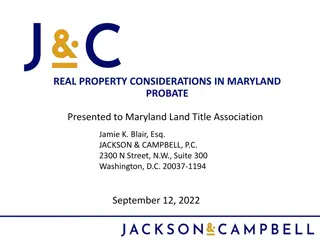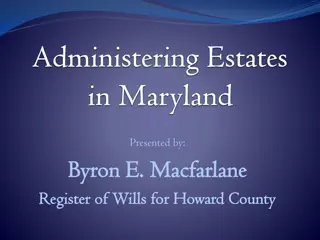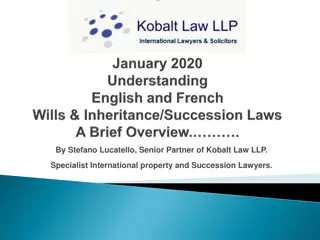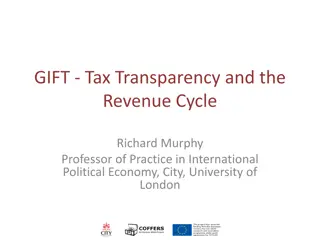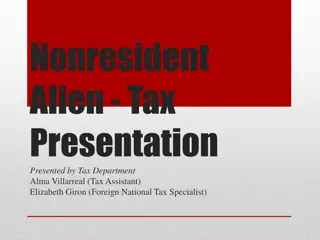
Understanding Maryland Estate Tax Laws and Updates
Discover the intricacies of Maryland's estate tax regulations, including filing requirements, common issues, legislative updates, and helpful tips for practitioners. Stay informed on key aspects such as portability, deductions, and inheritance tax implications to navigate the process effectively.
Download Presentation

Please find below an Image/Link to download the presentation.
The content on the website is provided AS IS for your information and personal use only. It may not be sold, licensed, or shared on other websites without obtaining consent from the author. If you encounter any issues during the download, it is possible that the publisher has removed the file from their server.
You are allowed to download the files provided on this website for personal or commercial use, subject to the condition that they are used lawfully. All files are the property of their respective owners.
The content on the website is provided AS IS for your information and personal use only. It may not be sold, licensed, or shared on other websites without obtaining consent from the author.
E N D
Presentation Transcript
Maryland Estate Tax Amanda Abel
Agenda What is the Maryland Estate Tax? Common Problem with Returns Legislative Updates/Portability Filings Helpful Hints for Practicioners Q & A 2
What is the Maryland Estate Tax? The Maryland estate tax is a state tax imposed on the transfer of property in a decedent's estate. Payment of the Maryland estate tax is due nine (9) months after the decedent's date of death. A Maryland estate tax return is required for every estate whose federal gross estate, plus adjusted taxable gifts, plus property for which a Maryland Qualified Terminal Interest Property (QTIP) election was previously made on a Maryland estate tax return filed for the estate of the decedent's predeceased spouse, equals or exceeds the Maryland estate tax exemption amount for the year of the decedent's death, and the decedent at the date of death was a Maryland resident or a nonresident but owned real or tangible personal property having a taxable situs in Maryland. The gross estate includes all property, real or personal, tangible or intangible, wherever situated, in which the decedent had an interest. It includes such items as annuities, joint assets with right of survivorship, transfers made without adequate consideration, the includible portion of tenancies by the entirety, certain life insurance proceeds, and general power of appointment property, to name a few. The value of the property must be based upon an appraisal from a Certified Appraiser. For more information on the gross estate, visit the IRS website regarding the Federal Estate Tax and review 2031 of the Internal Revenue Code. 3
Common Problems
Areas of focus Missing supporting documentation Untimely filings for portability when the estate is otherwise required to file Disallowed deductions Amended Returns requesting a refund Taxes paid to other jurisdictions also includable in the Maryland Estate QTIP election requirements Inheritance tax vs. Estate tax Untimely paid inheritance tax implications 5
Legislative Updates Portability Per SB0055 Retroactive If the pre-deceased spouse passed prior to January 1, 2019 an election must have been made on the Federal return for DSUE. (no change) If the pre-deceased spouse passed on/after January 1, 2019 AND their gross estate was over $5M the election must be made on a TIMELY FILED MET1. The current 5 year deadline is retroactive meaning that returns previously denied due to the previous 2 year deadline would now be allowed upon written request of the estate. If the pre-deceased spouse passes on/after January 1, 2019 and was NOT otherwise required to file (i.e. the gross estate was under $5M): The portability election must be made on the MET1 within the same time allowed by the IRS (currently 5 years from DOD) 6
Helpful Hints for Practitioners Filing for extension Responding to Correspondence Waiver Requests If the estate is still awaiting valuations as of the 9 month filing deadline file the extension request. Especially if the estate is anywhere close to the filing threshold A waiver request must be made in writing. These requests are first reviewed by the processors and then sent to the manager for determination. They generally take 6-8 weeks for a decision. If the request is denied, the estate runs the risk of accumulation of additional interest if the deficiency or assessment is not paid in full prior to the request. Make sure the contact person listed on the MET1 and/or MET1-E can promptly respond to correspondence from the Comptrollers office. They may receive notice and demands for filing, document requests, deficiency notices, assessments, etc. 7
Q & A 8
Thank you Amanda Abel AAbel@marylandtaxes.gov www.marylandtaxes.gov



![Town of [Town Name] Real Estate Tax Rates and FY 2024 Budget Summary](/thumb/62211/town-of-town-name-real-estate-tax-rates-and-fy-2024-budget-summary.jpg)

